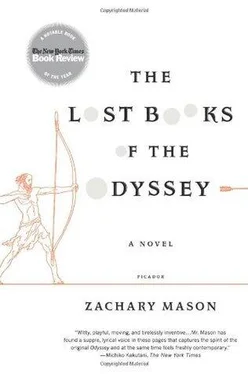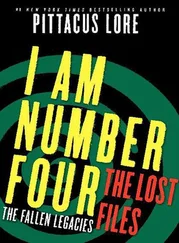*Tales of lycanthropy are common among the Pelasgians, the pre-Aryan inhabitants of Greece. Their version of the disease was a sort of royal malady, far from benign but a certain sign of divine descent and the right to rule. The reference to the self-cutting with the knife is obscure — possibly it has to do with the mystery cults whose celebrants were said to be able to pierce their skins but shed no blood. Another interpretation is that the grandfather is cutting away his humanity to reveal the animal within.
Alcinous, king of Phaeacia, and Odysseus, the wanderer, the eloquent, the silver-tongued, walked along wooded paths over high sea cliffs affording glimpses of the harbor, the distant city and the shining white-capped waves, the sort of place of which a man lost in mazy sea ways and the malice of petty gods might dream. Alcinous said:
Among the Phaeacians it is believed that each man lives out his life as a character in a story told by someone else. The family and city of each person’s storyteller (or possibly tellers) are unknown and perhaps unknowable but are subjects of frequent speculation. Certain philosophers are of the opinion that the evolution of history can be made to reveal the raconteurs’ national character. It has come to be more or less widely accepted (on the basis of the irregular depredations of locusts, of the propensity of Phaeacian kings for taking black-haired wives with green eyes and short tempers, of our excellence in archery, of the frequency in dreams of cavernous palaces carved into the living stone of low round mountains) that the storytellers are natives either of Phrygia, Sogdiana or distant Bamiyan. We have sent messengers to these kingdoms and even those beyond them but all have found nothing. The one thing on which all Phaeacians agree is that not enough is known to infer even a single teller’s name.
Odysseus replied:
Wise king of the happiest country I have seen, is it not better to live your well-favored life never knowing the teller’s name? As long as he is remote, a distant voice, an abstraction, you are the master of your life and lands and all things are possible to you. But once you have seen his face and taken his measure, then the endless possibilities, always an illusion, will dissolve, and your life will be revealed as the poor invention of a limited mind, rarely inspired.
And what if on seeing your kingdom, beautiful beyond compare, he were satisfied and fell silent? Perhaps it would be enough for him to end with a golden island in a distant ocean where a king and a storm-tossed mariner take the evening air.
Alcinous looked out over the ocean and said:
When his story ends a Phaeacian does not die but goes on to play another role in a different story told by the same teller. In this way the changes of station endemic to Phaeacian life are explained. Everyone in that city has a royal ancestor no less than four generations back and considers himself a prince biding his time — likewise, everyone has a great-aunt or great-uncle who must be confined in an attic.
Moreover, loyalties shift in Phaeacia as rapidly as the tide and there is a well-worn track from the throne room to the oubliette. Death finally comes, usually in the evening, when something in the raconteur fades out for good and in the midst of his story his eyes fix on the horizon and he trails off into silence, thinking of nothing. For this reason the Phaeacians consider silence an act of kindness, as sacred as guest friendship, a grant of repose to a distant stranger.
Odysseus looked at the man on his left and replied:
If you welcome death you are gently mad.
The path forked — fields and rivers lay to the left, and to the right, where Alcinous led them, were orchards and woods over sea cliffs. Alcinous said:
Death is unimportant. Even with the sweetness of the evening, the harbor full of my ships, the firelight in the palace windows, I would have lived enough, would have understood my life’s shape, if I could meet the teller and know him.
And for all the failures of my agents in distant lands, hope is not altogether dead. Certain sages contend that in the oceanic vastness of time the sea will bring him to our shores.
Evening had come to Phaeacia, and though they could still see light on the water and the crushed white shells of the path they had themselves become indistinct, a pair of silhouettes deep in conference in blue twilight shadows. They came to an apple orchard where fireflies winked amid branches that groaned in the wind and Odysseus said:
Let me tell you a story, Majesty. On a remote island a king who shares your ambition walks along a path of crushed shells with a grey-eyed vagabond plucked from the sea. The vagabond is well spoken and full of ready invention — the king wonders whether this is the teller he has longed to meet. As evening settles, island and ocean become indistinct — ships become as waves, towers as cliffs and trees as ghosts. The amiable pair come to an orchard, already half shrouded in darkness. The wanderer, who beneath his bland and cultured demeanor has a mind full of rapine and whose name has been on the lips of innumerable noblemen as their mouths filled with blood, falls a few steps behind the sovereign, maintaining a constant flow of words to comfort and distract, for he sees bright arrowheads winking among the apple trees and hears the creak of slowly drawn bow-strings. He had been expecting the king to try to confirm his suspicions and now the means are clear: Archers lie in wait for the pair with orders to kill their king’s companion — if he was the teller, he would not die in his own story and would thereby be revealed. And if he was just a man, well, no one need know that a nameless greybeard far from home died by treachery.
Odysseus paused. The gloaming had deepened and the orchard shook in a gusting wind that made his footsteps inaudible. When the wind subsided he went on:
Hark to the rush of the bird’s wings, Majesty, so close around us. They say the gods send us messages in their flight.
To continue. The wanderer, whatever else he may be, is economical of means. He falls silent for a moment and moves to the king’s left. As they come around a bend in the road the archers see their two shadows and fire at the one on their left who, though they do not know it, is their master, who I find has fallen behind me now, perhaps distracted by the humming passage of night birds, and now I am leaving the orchard alone as night swallows the last of the sun and I tell this story to myself, very quietly.
5. AGAMEMNON AND THE WORD
Agamemnon wanted a fortress on the wide plain before the walls of Troy but there was nothing to build with but a few trees and an unlimited quantity of sand. Therefore (at Odysseus’s suggestion) the Greeks dug the negative image of a palace in the white plain, a convoluted warren where cascades of fine grains trickled endlessly down the walls and into the tenuous corridors irregularly shored up with masonry. It was an uncomfortable home but Agamemnon said two things of his new capital: that it was not fully in keeping with the dignity of his ancestors but was perhaps fitting for a king at war, and that if he failed to take Troy at least his tomb was built around him.
In the center of the palace Agamemnon sat in state on a throne of granite in a chamber supported by the ribs of a scuttled ship. Around him were generals, astrologers, sages, polymaths, priests and oneiromancers, all filling his ears with their murmuring. In this way the court functioned much as it had in Mycenae, except for the frequent cave-ins and sand-slides that suddenly obliterated rooms, courtiers, armories, armorers, elegists and exits. Following the wisdom of the court geomancers it was considered impious to exhume any of the collapsed rooms and tunnels, a sin on a par with looting a tomb, so when more space was needed the miners struck out into virgin ground. Thus the underground palace evolved dendritically, sending off new shoots in all directions, sometimes opposed by unforeseen aquifers or plumes of hard rock, working around these obstacles with ant-like tenacity.
Читать дальше












